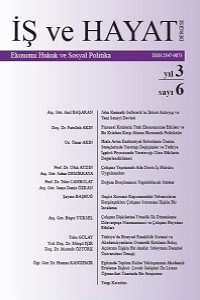CHANGES CREATED IN THE MANUFACTURING PROCESS OF RAPIDLY INCREASING INDUSTRIAL ROBOTS AND EVALUATION OF POSSIBLE POTENTIAL EFFECTS IN TURKEY LABOR MARKET
Abstract
The slowdown in the economic growth momentum of our country in recent
years has also put pressure on real wages as it is an important obstacle to employment growth. There are various cyclical and structural obstacles to the
recovery of high growth rates in the 2000s. In the upcoming period while political
and economic predictability is diminishing, it is observed that investments
are being revitalized by sectoral and regional government incentives. However,
the impact of new investments on employment growth is quite below
the expectations. Yet, artificial intelligence and production bands reinforced
by new generation robots are reducing the amount of labor required per unit
output especially in manufacturing industry day by day. The automation that
has become widespread in the production processes will lead to a permanent
shrinking of the demand for labor in the next decades. In this case, it is predicted
that both the level of employment and the real wages will be seriously
reduced. It is unlikely that these destructive influences can be prevented by
traditional economic policies. However, there is a strong need for business
circles and trade unions to be in a constructive business relationship with the
government in terms of attracting social and economic consequences to a more
bearable level.
Keywords
Robotics artificial intelligence economic growth industry 4.0 unemployment youth unemployment high-tech export
References
- Ekonomi Bakanlığı Web Sayfası
- Jared Diamond, Tüfek, Mikrop ve Çelik, Çeviren: Ülker İnce, Ankara: TÜBİTAK Yayınları, 2006
- OECD Web Sayfası
- TÜİK Web Sayfası
- Uluslararası Robotiks Federasyonu Web Sayfası
- https://www.statista.com/statistics/278349/average-annual-salary-of-an-employee-in-china/
- https://data.oecd.org/lprdty/labour-compensation-per-hour-worked.htm
- https://www.ekonomi.gov.tr/portal/content/conn/UCM/path/Contribution%20Folders/web/%C4%B0hracat/2023%20%C4%B0hracat%20Stratejisi/2023-ihracat_stratejisi.pdf
- http://www.tuik.gov.tr/HbPrint.do?id=24830
- http://www.tuik.gov.tr/UstMenu.do?metod=temelist
- http://www.doingbusiness.org/reports/global-reports/doing-business-2017
- https://data.worldbank.org/indicator/NY.GDP.MKTP.KD.ZG?locations=CN&view=chart
- Data extracted on 02 Nov 2017 21:54 UTC (GMT) from OECD.Stat
- IFR, (Uluslararası Robotiks Federasyonu) National association
HIZLA ARTAN ENDÜSTRİYEL ROBOTLARIN ÜRETİM SÜREÇLERİNDE YARATTIĞI DEĞİŞİMLER VE TÜRKİYE İŞGÜCÜ PİYASASINDA YARATACAĞI OLASI ETKİLERİN DEĞERLENDİRİLMESİ
Abstract
Türkiye’nin iktisadi büyüme ivmesinin son yıllarda yavaşlaması istihdam artışı
bakımından önemli bir engel olduğu gibi reel ücretler üzerinde de baskı
oluşturmaktadır. 2000’li yıllardaki yüksek büyüme oranlarının yeniden yakalanması
önünde çeşitli konjonktürel ve yapısal engeller bulunmaktadır. Siyasi
ve ekonomik öngörülebilirliğin azaldığı önümüzdeki dönemde, yatırımların
sektörel ve bölgesel devlet teşvikleriyle canlandırılmaya çalışıldığı gözlemlenmektedir.
Ne var ki, yeni yatırımların istihdam artışı üzerindeki etkisi beklenenin
çok altında seyretmektedir. Zira; yapay zeka ve yeni nesil robotlarla güç-
lendirilen üretim bantları bilhassa imalat sanayiinde birim çıktı başına gerekli
emek miktarını her geçen gün düşürmektedir. Üretim süreçlerinde yaygınlaşan
otomasyon, önümüzdeki on yıllarda emek talebinde kalıcı bir daralmaya yol
açacaktır. Bu durumun ise gerek istihdam düzeyini gerekse reel ücretleri ciddi
şekilde düşüreceği öngörülmektedir. Bu yıkıcı etkilerin geleneksel iktisat politikalarıyla
engellenmesi mümkün gözükmemektedir. Ancak, sosyal ve iktisadi
sonuçlarının daha katlanılabilir seviyeye çekilmesi bakımından iş çevreleri ve
sendikaların hükümetle yapıcı bir işbirliği içerisinde olmasına şiddetle ihtiyaç
duyulmaktadır.
Keywords
Robotiks Yapay Zeka İktisadi Büyüme Endüstri 4.0 İşsizlik Genç İşsizliği Yüksek Teknolojili İhracat
References
- Ekonomi Bakanlığı Web Sayfası
- Jared Diamond, Tüfek, Mikrop ve Çelik, Çeviren: Ülker İnce, Ankara: TÜBİTAK Yayınları, 2006
- OECD Web Sayfası
- TÜİK Web Sayfası
- Uluslararası Robotiks Federasyonu Web Sayfası
- https://www.statista.com/statistics/278349/average-annual-salary-of-an-employee-in-china/
- https://data.oecd.org/lprdty/labour-compensation-per-hour-worked.htm
- https://www.ekonomi.gov.tr/portal/content/conn/UCM/path/Contribution%20Folders/web/%C4%B0hracat/2023%20%C4%B0hracat%20Stratejisi/2023-ihracat_stratejisi.pdf
- http://www.tuik.gov.tr/HbPrint.do?id=24830
- http://www.tuik.gov.tr/UstMenu.do?metod=temelist
- http://www.doingbusiness.org/reports/global-reports/doing-business-2017
- https://data.worldbank.org/indicator/NY.GDP.MKTP.KD.ZG?locations=CN&view=chart
- Data extracted on 02 Nov 2017 21:54 UTC (GMT) from OECD.Stat
- IFR, (Uluslararası Robotiks Federasyonu) National association
Details
| Journal Section | Articles |
|---|---|
| Authors | |
| Publication Date | December 25, 2017 |
| Acceptance Date | October 30, 2017 |
| Published in Issue | Year 2017 Volume: 3 Issue: 6 |


